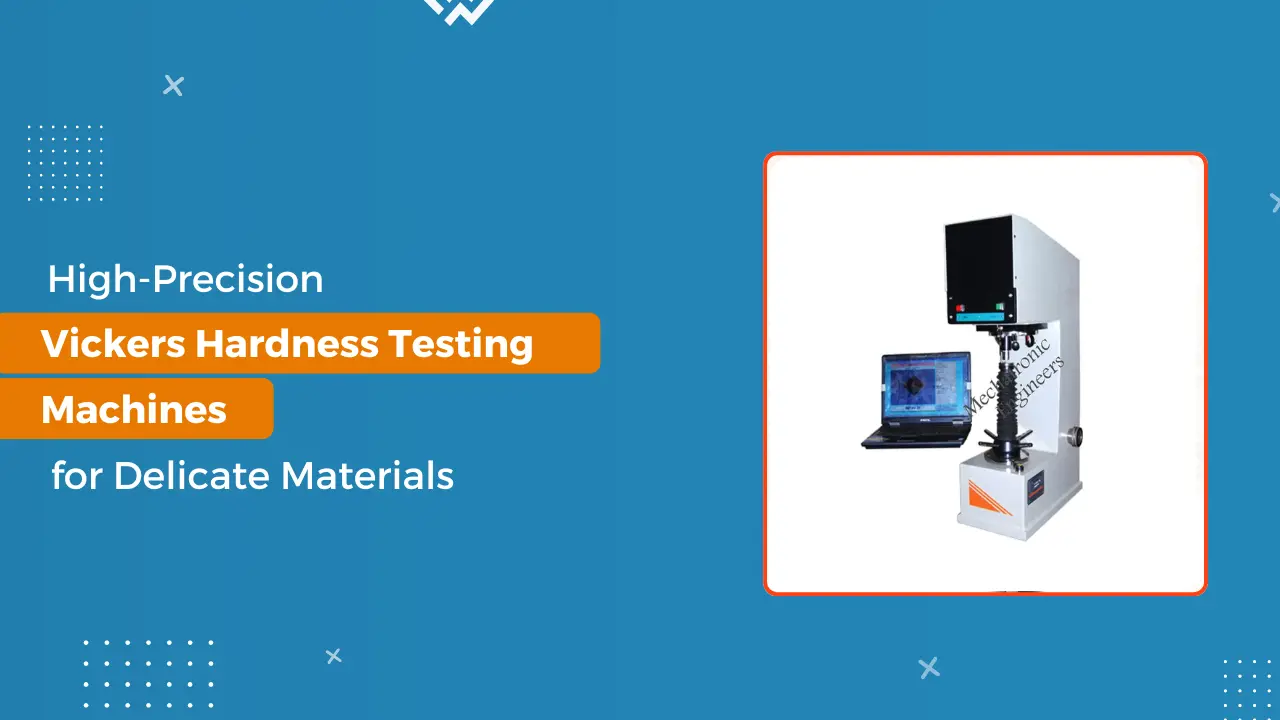
In today’s competitive industrial landscape, material integrity and performance are non-negotiable. Whether in aerospace, electronics, medical devices, or advanced manufacturing, even the smallest components must meet strict quality standards. This is where the Vickers Hardness Testing Machine becomes indispensable.
Tailored for fine and delicate material testing, the Vickers method enables precision evaluation of hardness in micro-components, coatings, and materials with thin cross-sections. These machines offer accurate, repeatable results—crucial for reliable production and research.
Designed with modern testing demands in mind, Vickers Hardness Testing Machines bring together digital innovation, precise mechanics, and compliance with global standards.
What is a Vickers Hardness Testing Machine?
The Vickers hardness test operates by applying a controlled load through a diamond-shaped indenter on the test surface. The test leaves a square-shaped indentation, and the diagonals of this impression are measured to calculate the material’s hardness.
Because the load applied can be extremely light, this method is ideal for small or thin samples, such as films, coatings, foils, and microstructures. Unlike other testing methods, Vickers offers versatility and high-resolution results across a range of materials including metals, ceramics, and composites.
Why Choose Vickers Over Other Hardness Testing Methods?
Compared to Brinell or Rockwell testing, Vickers offers the following advantages:
If you’re exploring a new hardness tester, reviewing the benefits of Vickers over other methods is a crucial step in identifying the right solution.
Explore our complete range of hardness testing machines to compare the best fit for your application.
Features of Vickers Hardness Testing Machines
1. Advanced Precision Optics
Modern Vickers machines are equipped with high-resolution optical systems for measuring indentations with micrometre-level accuracy. This eliminates subjectivity and ensures reliable results even in highly reflective or small samples.
2. Digital Measurement and Control
Machines come with touchscreen interfaces, advanced software integration, and real-time analytics. Users can automate report generation, export data in multiple formats, and ensure regulatory compliance with ease.
3. Flexible Load Range
Our machines offer a wide spectrum of test loads—from 10g for microhardness to several kilograms for macro applications—making them suitable for both lab testing and production floors.
4. Modular Designs
Choose from manual, semi-automatic, or fully automatic models. Add optional upgrades such as motorized stages, auto-focusing, and computer-integrated control systems.
All machines are built to comply with ASTM E384, ISO 6507, and other global hardness testing standards.
Who Should Use Vickers Hardness Testing Machines?
Vickers testing machines are perfect for organizations that work with fine, high-precision materials. Common sectors include:
Electronics and Microtechnology
Used to test solder joints, wire bonding, and micro-layers on electronic circuits.
Aerospace and Automotive
Essential for measuring hardness in coatings, weld zones, and lightweight structural materials.
Tool and Die Manufacturing
Evaluates the wear resistance of precision dies, molds, and coated tools for longevity and performance.
Research and Development
R&D centers use Vickers testing for developing and comparing new materials, coatings, and composites under varying conditions.
Invest in Precision with Vickers Hardness Testing
When it comes to evaluating small and delicate materials, Vickers Hardness Testing Machines offer a level of precision that few other methods can match. Whether in a lab environment or on the production floor, these machines ensure consistent, accurate, and compliant results.
Backed by robust construction, digital enhancements, and customizable features, Vickers machines are a long-term investment in material quality and product reliability.
Upgrade Your Testing Capability Today
Looking to elevate the precision of your material testing process?
Upgrade your lab with our advanced Vickers Hardness Testing Machines. Contact us now for detailed technical specifications, and expert guidance tailored to your needs.
Frequently Asked Questions (FAQs)
It’s ideal for metals, ceramics, coatings, composites, and microstructures. The light load capability makes it suitable for small and thin samples.
Typical loads range from 10 grams to 50 kilograms depending on the material and application.
Highly accurate, especially with optical or digital measuring systems. Automated machines can achieve repeatability within a fraction of a micron.
Yes. Machines are manufactured in accordance with ASTM E384, ISO 6507, and other major global hardness testing standards.
Absolutely. Many models feature data logging, USB and network connectivity, and software for LIMS integration.
Basic training is usually sufficient. For automated and digital models, intuitive interfaces minimize the learning curve.
With standard use and proper calibration, diamond indenters can last for thousands of tests.
